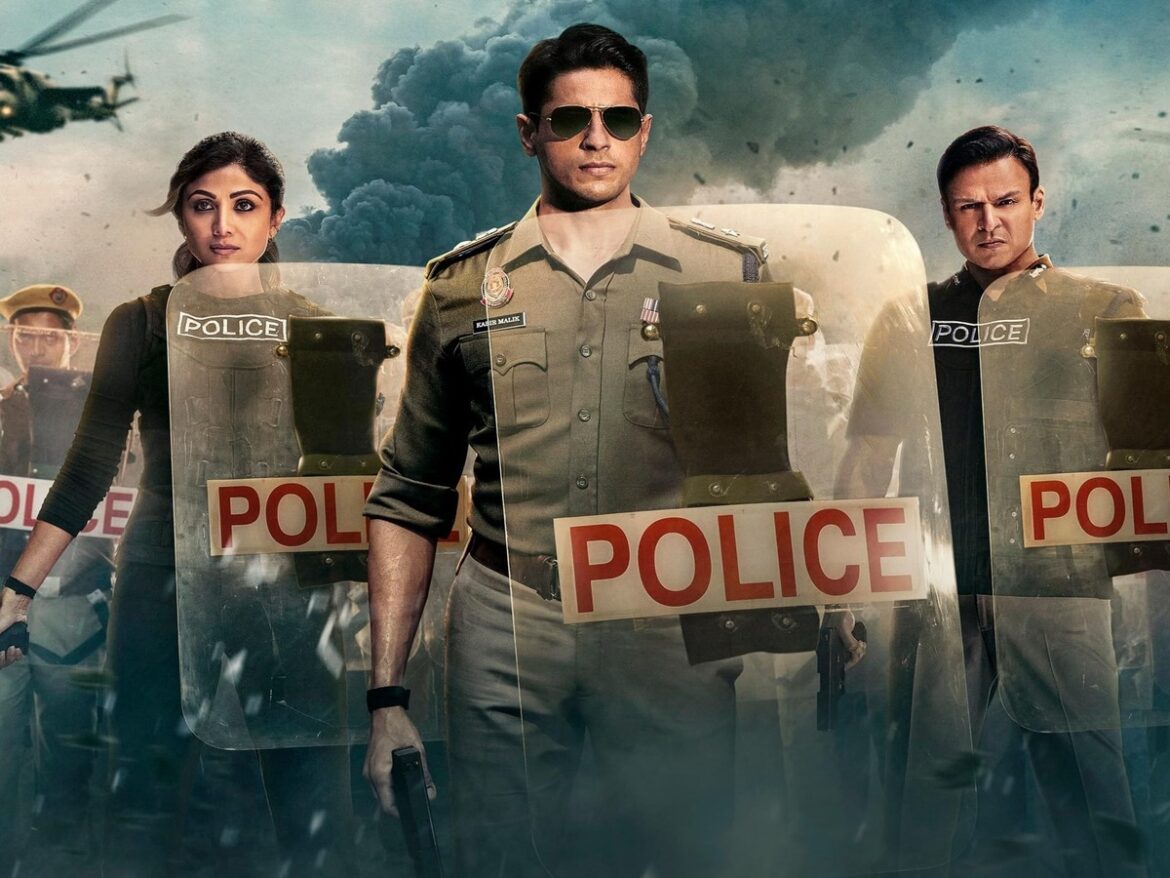All Copped Out:
The creator of Bollywood’s cop universe makes a web series, you expect swag to hurtle out of the screen. Rohit Shetty’s Indian Police Force takes itself much too seriously and is inexplicably deferential towards Delhi police, made up entirely of patriots and saints. That aata maazi satakli moment never comes. For six episodes you wait for cars to somersault and are rewarded in the last episode, when a brutal car chase through the streets and bazaars of Dhaka results in the mowing down of cars, buses, humans, obstructing structures and loads of vegetables.
Directed by Shetty and Sushwanth Prakash, scripted by Sandeep Saket and Anusha Nandkumar, the plot is yawn-inducing. A terrorist, Zarar (Mayyank Taandon), sets off bombs in various Indian cities, because his family suffered during a riot at some unspecified time and place. His rage was misdirected into violence by a madarsa teacher (Rituraj Singh). When the show begins, Delhi has been attacked and cops Vikram (Vivek Anand Oberoi) and Kabir (Sidharth Malhotra) with partner Rana (Nikitin Dheer) set out to investigate. It is mentioned that blasts have taken place before in other cities, but Delhi police, in their starched and ironed uniforms are caught unawares. The only clue they manage is a street kid eyewitness who helps them to sketch the perpetrator.
Zarar meanwhile, is living in the city as Haider, and even carrying on a romance with his cohort-landlord’s daughter, the teeth-grindingly simpering Nafisa (Vaidehi Parshurami). When the show should have been ratcheting up the tension, it pauses for a moony flashback song between Kabir and his dead wife, (which explains why he looks glum all the time, and why his mother brings his tiffin to the office in this rapid food delivery age!), kid’s birthday party and later in the series, a wedding!
The show perks up when female cop Tara Shetty (Shilpa Shetty) turns up from Gujarat, to berate the boys for their tardiness. But she has the time for full glam makeup and stylish wardrobe. After much slow-motion purposeful striding, they trace the hideout of the terrorists and there is a shootout—which is one of the terrific action set pieces designed by Shetty and executed by Sunil Rodrigues—but Zarar escapes. (The DOPs Girish Kant and Raza Hussain Mehta have their work cut out, shooting in tight spaces and narrow streets.)
Kabir goes off the books to trace Zarar when blasts rock Jaipur and the show really takes off when they almost miss him in Goa and then have to bend some rules to reach him in Bangladesh. The last two episodes have all the pace and grip that a show like this required to hook the viewer. An undercover RAW agent enters the picture here, who will hopefully remain in the hinted at sequel set in Nepal. The good thing is that the story of how the police force functions has potential and there are enough real-life cases across the country to inspire an imaginative scriptwriter.
The trope of the dedicated Muslim cop held up as an example of who the community should consider a role model should really be discarded now, along with the lecture on good and bad Islamic behaviour. As should the loud background score (Amar Mohile) that leaves barely a moment of silence to relish a moment. The name of Indian Mujahideen is brought up, but terrorism has moved far ahead to be reduced to a personal revenge drama.
Shetty’s strengths have been action and humour – the former he delivers in spades, the latter is totally lacking in Indian Police Force. The actors do their roles with sincerity, but that spark is missing, which would transform an efficiently made police procedural into an entertaining and engaging series. The argument could be that this is not Singham, it is a realistic show, with a researcher on board (S. Hussain Zaidi) to prove it. But then, it’s not Delhi Crime either, and nobody could accuse that show of being boringly realistic.
(This piece first appeared in rediff.com)

